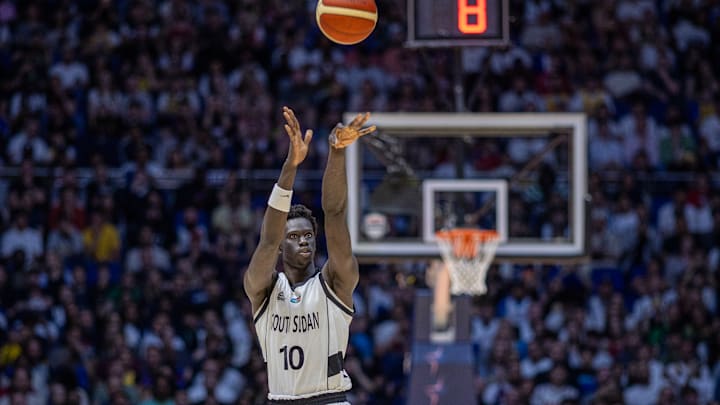After a fairly silent offseason, the Cleveland Cavaliers have made a move.
With three absent two-way slots, the Cavs signed former Charlotte Hornets center JT Thor to a two-way spot. Thor most recently played for South Sudan during the Group Phase of the 2024 Paris Olympics, facing off against Nikola Jokic and Team Serbia and LeBron James and Team USA. The Cavs signing Thor is their first addition to the wine and gold since drafting Jaylon Tyson 20th overall earlier this summer.
Cleveland still has two open full roster spots assuming that Isaac Okoro eventually returns. After the Thor signing, the Cavs' work this summer is not complete, but the next step forward is difficult to know. The Cavaliers opened the offseason with a new head coach in Kenny Atkinson and agreeing to a contract extension with superstar Donovan Mitchell. Outside of a coach and extensions, Cleveland has not made any significant decisions this offseason. After failing to find an Okoro sign-and-trade, the Cavs' remaining options are limited.
Going forward, the Cavaliers still must find a reliable backup center to solidify the frontcourt rotation. Adding another wing shooter would complement Cleveland's starring core.
The Cavaliers could explore the trade market to complete the rotation, but the franchise has seemed unwilling to part with any meaningful contributors this summer. Unless the Cavs discover hidden talent among the rest of the Olympic contestants, adding any steady contributors this summer through free agency will be nearly impossible.
Although Thor is only joining the Cavaliers as a two-way player, his addition is a significant example of Cleveland's lack of direction and plan.
The Cavaliers have no plan this offseason
Signing Thor to a two-way deal gives the Cavs a cheap, flexible backup center. Thor will have limited chances to play alongside the main roster before the team must decide on his future. That flexibility illuminates the real problem. The Cavaliers do not have any plan in place that would allow them to commit to any direction.
While Thor played well with South Sudan, he was hardly an Olympic standout. In three total games, Thor averaged 6.7 points while shooting 36.4 percent from the field. He only achieved a field goal percentage above 50 percent in one game, shooting 3-of-4 against Serbia. He grabbed 4.7 rebounds per game.
In the NBA, Thor played the 2023-24 season with the Hornets, averaging just 3.2 points and 2.3 rebounds in 12.4 minutes per game. He appeared in 63 contests, starting in three of them. While the young big man has flashed raw potential at just 21 years old, he is a far cry from the type of player the Cavaliers need to add this offseason.
Thor provides a highly temporary option, but the team has been entirely incapable of making a lasting decision outside of the core four this summer. This indecisive attitude arose in the last two trade deadlines, as well, although the lacking depth was already an apparent issue.
How the Cavs have failed to improve
After coaching with Team France, Atkinson rejoined the Cavaliers to help determine the next moves. Rumors circulated around France's standout forward Guerschon Yabusele, a former Boston Celtic seeking a second chance at the NBA. Shortly after Thor's signing, though, the veteran forward signed a one-year deal with the Philadelphia 76ers, taking another potential prospect off the Cavaliers' list.
Early in the offseason, the Cavaliers had a clear plan and focus: re-sign the core four and add an offensive-minded coach to lead the team. Since then, however, the Cavs fumbled numerous attempts to build a competent supporting cast around their top players. In the past two postseason runs, the Cavs' bench has contributed poorly and hurt the team's chances at success. This year, the depth quickly fell apart, posting painfully poor shooting splits and averages. The Cavaliers have a clear need but do not have any obvious path to fulfill it.
Stubbornly, Cleveland overvalued Okoro in trade talks, leading to the Brooklyn Nets and Cavs never coming to terms. Internally, though, the Cavaliers seem to undervalue Okoro, as the young wing turned down multiple long-term contracts with the Cavs.
The Cavaliers' unclear value of Okoro and the lack of aggression to improve a roster with underwhelming depth showcase a growing issue for the organization. While the core has been assembled, they are no closer to a title contender and do not hold valuable trade assets or financial flexibility to take a step forward. Throughout the summer, the Cavs have attempted to curtail the NBA's new restrictive Collective Bargaining Agreement, passing on opportunities to save money. Should Okoro accept his $11.8 million qualifying offer this summer, the Cavaliers will already pass that threshold without a complete roster.
Giving up top free agents with a portion of the nontaxpayer mid-level exception this summer is a reasonable move with the extensions and Okoro's free agency at the top of the priority list. Now, the Cavaliers will likely ultimately fail to avoid the dreaded tax line without any noticeable roster improvements. The direction of the team is unclear and growingly concerning.
Within the core, the Cavs also have not found a consistent route to maximizing each core player's value. The frontcourt and backcourt have performed best when separated. With a mismatched core, building a competent depth chart becomes a nightmare.
The Cleveland Cavaliers do not seem to know how they want to approach their roster from top to bottom, but they are unwilling to take a risk and change. They do not need to make headlines with a shocking blockbuster trade, but they need direction and purpose.
